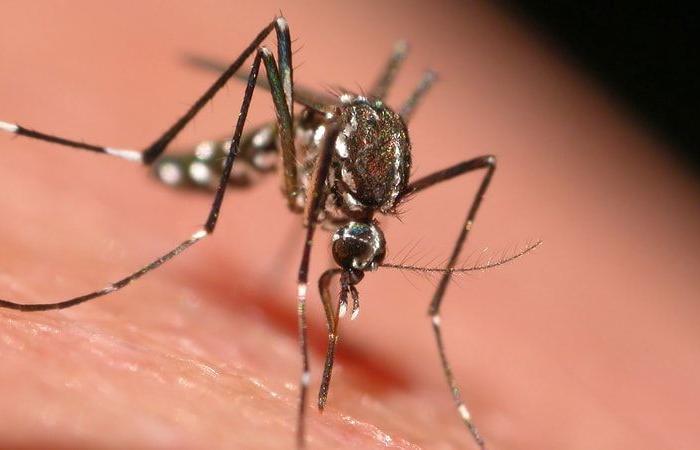Paris, France – As the Olympic Games in Paris approach, French researchers studied the ability of tiger mosquitoes to transmit 5 viruses, and determined the incubation time necessary for the viruses to be found in the mosquito’s salivary glands in sufficient quantity to infect a human [1]. Their results are published in Eurosurveillance[2].
Olympics, period of vigilance
For several months now, infectious diseases specialists, epidemiologists and even medical biologists have been warning about the potential infectious risk linked to the tiger mosquito in the context of the Olympic Games in Paris this summer. And the increase in the number of cases observed between 1is January and April 19, 2024 – 1,679 imported cases of dengue were recorded in mainland France, i.e. 13 times more than last year over the same period (source SPF) – don’t blame them. What can we say about the summer period which will see many international visitors arriving on French territory, particularly from countries endemic for dengue fever, to attend the Olympics, while knowing that other arboviruses are likely to be transmitted by mosquitoes.
Transmission delay of 5 arboviruses
To anticipate this risk, researchers from the Arbovirus and insect vectors team at the Institut Pasteur, in collaboration with the Regional Mosquito Control Agency, the National Reference Center for Arboviruses (Inserm-Irba), analyzed the capabilities ofAedes albopictus present in Ile-de-France to transmit 5 arboviruses at a temperature of 28°C, probable in this region at this period, and counted the number of days between the first infection and the possibility of the virus being transmitted during a new bite. In addition to dengue, chikungunya and Zika viruses, which we already know can be transmitted by the tiger mosquito, the researchers studied the Usutu virus and the West Nile virus, which are naturally transmitted by another species mosquito, mosquito Culex pipiens (or also called “common mosquito”).
In a security level 3 laboratory, researchers studied the ability of tiger mosquitoes to transmit these 5 viruses, and determined the incubation time necessary for the viruses to be found in the mosquito’s salivary glands in sufficient quantities to infect a human. . Their results are as follows: at 28°C, the West Nile virus needs 3 days before being retransmitted by the mosquito; this period is between 3 and 7 days for the chikungunya virus and Usutu; and it is between 14 and 21 days for dengue and Zika.[2]
Diagram credit: SPF [1]
“This information is essential to assess the additional risk with the organization of the Olympic Games in Paris, combining a significant mixing of populations with a period of return of vacationers from endemic areas and a period conducive to the development of mosquitoes” indicates the press release. from the Pasteur Institute [1]. And all the more so since they will make it possible to “develop appropriate control strategies”.
“If a case of dengue fever is detected in the Ile-de-France region, we now know that disinfestation must take place within 21 days. These results make it possible to adjust the window of opportunity so that the approach is optimal,” emphasizes Anna-Bella Faillouxhead of the Arbovirus and insect vectors unit at the Pasteur Institute, who led this study [1]. “Depending on the temperatures that will affect the Ile-de-France region this summer, this information will be essential to adapt containment measures », she adds.
What precautions should you take as the Olympics approach?
In the event of a diagnosis made for one of these diseases, an investigation is carried out by the Regional Health Agencies in order to determine the places where these people live or have passed in the previous days and thus define the areas to be disinected. It is therefore recommended that anyone returning from a trip and presenting symptoms of fever or body aches consult their GP without delay, and specify their area of origin.
“The alert system in France is efficient, the processes to follow and the actions to take are already operational thanks to the overseas territories located in endemic areas which have made it possible to acquire expertise on these diseases and their epidemiological monitoring. There is in particular the Arbo-France network, to which my team is affiliated, and we are contacted as soon as an arbovirus is detected,” says Anna-Bella Failloux. [1].
Since 2006, the tiger mosquito has been subject to increased surveillance between May 1 and November 30. Management of reports, monitoring of the presence of mosquitoes and rapid intervention around human cases of disease (vector control) are the responsibility of the Regional Health Agencies (ARS), in conjunction with their operators, like the 2 operations mosquito control which took place in the 13thth district of Paris (75) and Colombes (92) in the summer of 2023.
Diagram credit: SPF [1]
This work, focused on mosquitoes from Ile-de-France for this first study, will soon be extended to the whole of France, knowing that extrinsic incubation times vary depending on tiger mosquito populations and local temperatures.
Sign up for the newsletters de Medscape : select your choices






